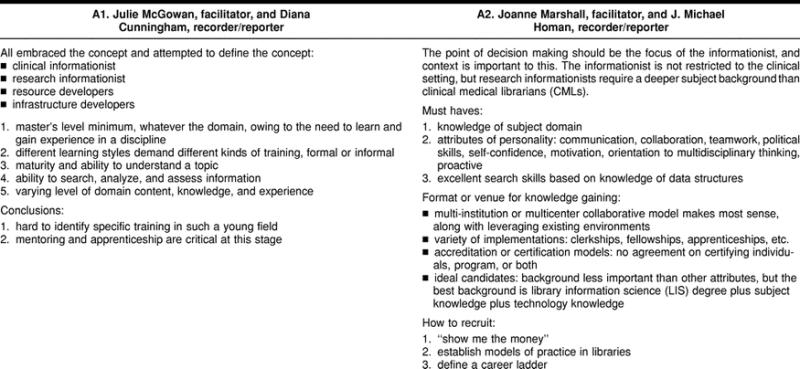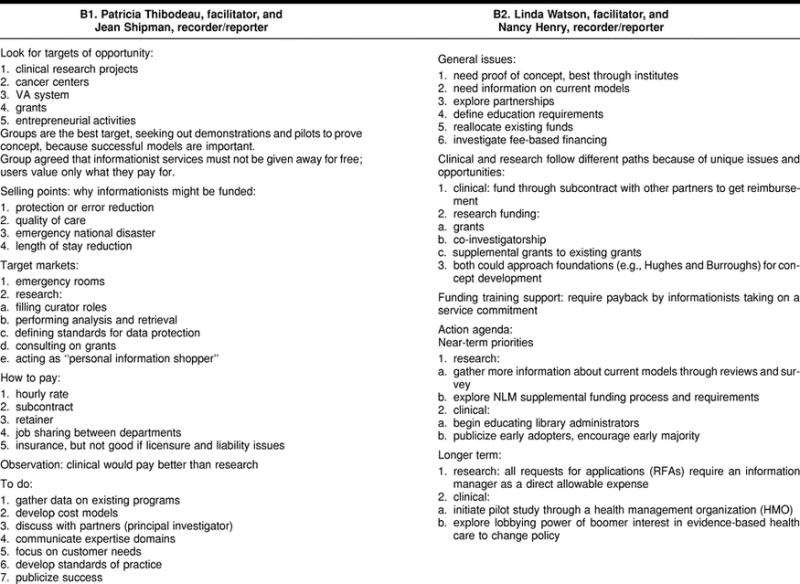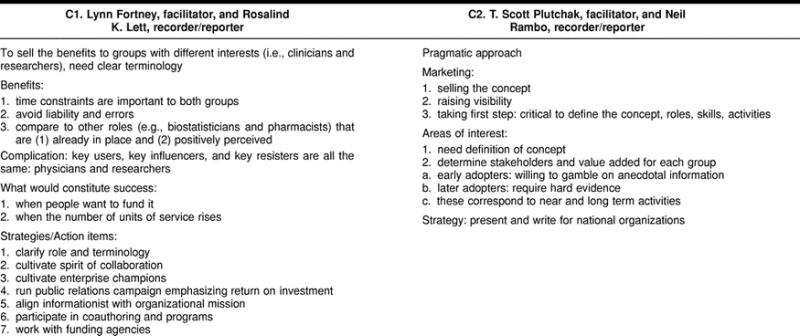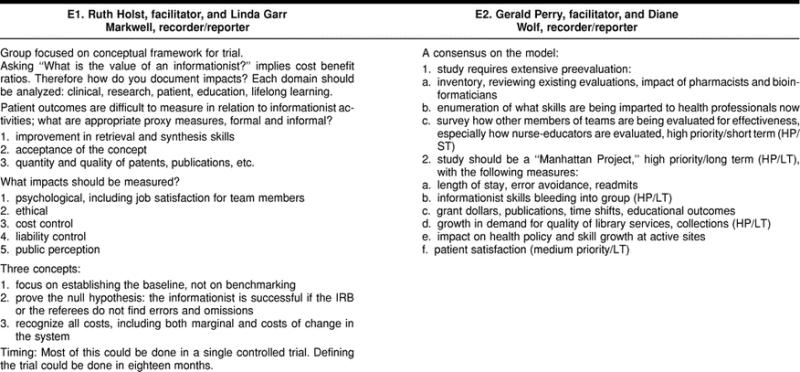INTRODUCTION
On April 4 and 5, 2002, a conference was conducted at the National Library of Medicine's (NLM's) Lister Hill Center to explore the concept of an “informationist” as proposed by Davidoff and Florance [1]. The conference was funded by NLM and hosted by the Medical Library Association (MLA). The goal was to facilitate a national discussion, derive a consensus definition, and develop recommendations for an action agenda for the informationist professional in the clinical and research domains. The conference objectives were to:
examine the need for an informationist type of health information professional in health care and biomedical research settings;
discuss how informationists compare with existing professionals in terms of their unique roles;
identify the requisite knowledge, skills, and attributes for informationists in different settings;
determine desirable education and training models and sources for informationists;
identify how to determine the value of an informationist in health care and research settings (evaluation);
draft desirable financing models (including salary, third-party reimbursements, indirect costs, grants, fellowships, institutional cost-savings, etc.);
formulate implementation models that may include grants, fellowships, pilots, and so on; and
determine promotional vehicles for the informationist concept.
Participants included health sciences librarians, physicians, nurses, bench researchers, pharmacists, association officers and executive directors, library school educators and deans, medical school curriculum directors, and government agency representatives. National Network of Libraries of Medicine (NN/LM) executive and associate directors, librarians from the National Institutes of Health and NLM, and MLA headquarters staff were also present. More than seventy-five attendees listened to twenty-three speakers, who represented different types of health care professionals. Participants also took part in brainstorming group sessions with the results of the groups' thoughts reported to all. A list of attendees may be found on the conference Website. A reception was held at the close of the first day in the Lister Hill Center foyer that permitted more informal exchange of thoughts among conference attendees.
PLANNING
In May of 2001, the MLA Board of Directors charged the Informationist Conference Task Force to:
determine the best meeting format to facilitate: (1) further exploration of the concept of the “informationist” as it relates to health sciences librarians or libraries and education for the profession and (2) preparation of recommendations regarding the next actions that the health sciences library profession should pursue;
draw up a list of invited attendees and alternates covering major stakeholders, including, but not limited to, the following groups: MLA members (in addition to members of the MLA Informationist Conference Task Force), Association of American Medical Colleges Group on Information Resources (AAMC/GIR), the Association of Academic Health Sciences Libraries (AAHSL), NLM, and the Philadelphia Regional Chapter informationist symposium editors and authors;
plan the agenda for the invitational conference to optimize attendees' time; and
obtain recommendations for subsequent actions as they pertain to the profession.
No formal meeting of the entire task force ever occurred. Email correspondence, telephone calls, and task force subgroup meetings at various MLA Board of Director meetings and at the Association of American Medical Colleges (AAMC) meeting in November 2001 were employed for planning the conference. Task force members included: Jean Shipman (chair), M.S.L.S., director, Tompkins-McCaw Library for the Health Sciences, Virginia Commonwealth University; Diana Cunningham, M.L.S., M.P.H., associate dean and director, Medical Sciences Library, New York Medical College; Jacqueline Donaldson Doyle, M.S., manager, Clinical Innovation and Continuing Medical Education, Banner Health System; Valerie Florance, Ph.D., program officer, Extramural Programs, NLM; Ruth Holst, M.S.L.S., manager, Medical Library, Columbia Hospital; Carol Jenkins, M.L.S., president, MLA, and library director, Health Sciences Library, University of North Carolina at Chapel Hill; Joanne Marshall, Ph.D., associate professor, School of Information and Library Science, University of North Carolina at Chapel Hill; Julie McGowan, Ph.D., professor of knowledge informatics and pediatrics and director, Ruth Lilly Medical Library, Indiana University School of Medicine; T. Scott Plutchak, M.L.S., director, Lister Hill Library, University of Alabama at Birmingham; and Carla J. Funk, M.L.S., M.B.A., CAE, executive director, MLA headquarters.
The task force members discussed the various roles an informationist could perform and the potential work settings for this professional. After much deliberation, the decision was made to concentrate on only two work arenas for purposes of the two-day conference, the clinical and research settings. Other discussions centered on the conference content. The task force decided to have three concept exploration panels—one dealing with the clinical setting, one with the research setting, and one with educating informationists. Following these panels, breakout group brainstorming sessions would take place, ten groups total, with two groups focusing on each of five topics. Reports from all groups would then be shared. A final action agenda panel would provide ideas on how to take the informationist concept from theory to practice. Marshall Keys, Ph.D., MDA Consulting, was hired as a facilitator and provided a summary of lessons learned from each panel.
INVITED SPEAKERS AND CONFERENCE AGENDA
The goal of the conference was to have a variety of health professionals discuss their views of what informationists could offer to their work environments and their health care specialty fields. Speakers also expressed their views on the issues that needed to be addressed for transforming the concept into practice; for example, peer acceptance, funding, licensure requirements, and educational preparation. The full conference agenda is posted on the conference Website.
The first day began with welcoming remarks from Kent Smith, deputy director, NLM, and Carol Jenkins. The keynote speakers, Frank Davidoff, M.D., editor emeritus, Annals of Internal Medicine, and Valerie Florance, Ph.D., were then introduced by Betsy Humphreys, M.L.S., associate director for library operations, NLM.
Keynote presentations
Dr. Davidoff began by describing the gap between medical science and medical practice, stating that barriers to accessing knowledge-based information are the primary reason why such information is not being applied at the bedside. He used a “diffusion of innovation” framework, based on the work of Everett Rogers [2], to provide some insight into why published scientific evidence is not diffused more rapidly into medical practice. Dr. Davidoff likened the informationist concept to an innovation that has not caught on in the health care practice environment despite the fact that the clinical librarian and clinical pharmacist concepts have been around since the late 1970s. He used Rogers' work to outline the complex factors that explain why innovations are not diffused into practice.
Dr. Davidoff described Gertrude Lamb as an innovator and acknowledged that there were a number of early adopters of the clinical medical librarian concept. However, innovations cannot survive without the acceptance of what Rogers calls an “early majority,” which is where the clinical medical librarian concept has been stymied. Dr. Davidoff questioned how the profession should move on.
Dr. Davidoff completed his remarks by applying Donald Berwick's rules for innovation to the informationist concept [3]. These rules include:
find a sound innovation,
identify and support innovators,
invest in early adopters,
make early adopter's behavior and activity observable,
trust and enable reinvention,
create national standards,
create slack for change, and
lead by example.
Dr. Florance discussed the results from recent reports that support the need for informationists. These included the “desirable futures” identified by the better_health@here.now delphi study and the Integrated Advanced Information Management Systems (IAIMS). The Next Generation tracks of the AAMC's better_health@here.now program [4] as well as Objective 3.2: Further Training in Medical Information and Librarianship of NLM's Long Range Plan 2000–2005 [5].
The richness and complexity of the Internet-enabled information environment makes delivering useful information a grand challenge. In clinical care settings, the problem is how best to deliver the subset of information that supports good decisions. For context-appropriate information to be delivered into care settings, changes are needed at the source. For example, integrated access to information that comes from different sources requires commonality of syntax and semantics and permeable boundaries between formats and organizations. Selecting and integrating the right information from all possible resources also requires information expertise. Informationists bring this expertise to the point where decisions are made. To be effective in the decision setting, informationists must be cross-trained, considered true members of the health care team, and context-based.
Questions still unanswered for the informationist concept include:
How should such individuals be trained, so they can provide information at the point of health care delivery?
Where will these people find work?
How scalable is the concept?
Can machines be used to help perform some of the tasks?
Who pays for an informationist's services?
Will the benefits of an informationist be proved?
Concept Exploration Panel I: the informationist in a clinical setting
The first concept exploration panel was moderated by T. Scott Plutchak. The panel considered the varying interpretations of the term “informationist” and sought to define the sorts of services that clinicians need and expect and the different ways that such services have been provided in the past and might be provided in the future. Speakers and the areas they represented included:
Clinical Information Services Recipient: William F. Walsh, M.D. professor of pediatrics and chief of nurseries, Vanderbilt University Hospital; Clinical Medical Librarian: Diane Wolf, M.S.L.S., AHIP, associate director, Medical Libraries, Christiana Care Health System; Clinical Pharmacist: Edward M. Bednarczyk, Pharm.D., research assistant professor of nuclear medicine, Pharmacy Practice, State University of New York at Buffalo; Clinical Research Administrator: John I. Gallin, M.D., director, NIH Clinical Center, National Institutes of Health; Consumer Health Provider: Patricia F. Brennan, R.N., Ph.D., FAAN, FACMI, professor, School of Nursing and College of Engineering, University of Wisconsin–Madison; Academic Evidence-Based Medicine: K. Ann McKibbon, M.L.S., doctoral student, Center for Biomedical Informatics, University of Pittsburgh; and Clinical Evidence-Based Medicine: Rosalind K. Lett, M.S.L.S., AHIP, director, Medical Library, Meharry Medical College.
Concept Exploration Panel II: the informationist in a research setting
The second concept exploration panel was moderated by Linda Watson, M.L.S., director, Claude Moore Health Sciences Library, University of Virginia, and addressed the question of informationists in the biomedical research setting, both in traditional research settings as well as the emerging discipline of bioinformatics. The primary question discussed was: Do the concepts and arguments put forth in the editorial by Davidoff and Florance, which focused on the clinical setting, and the responses it provoked hold true in the research arena, or are there significant differences that must be articulated? Speakers included:
Institutional Review Boards: Kathleen Oliver, M.S.L.S., M.P.H., associate director, Welch Medical Library, Johns Hopkins University; Bench Researcher: Stephen Desiderio, M.D., Ph.D., investigator, Howard Hughes Medical Institute, Johns Hopkins University School of Medicine; Bioinformatics: Michele R. Tennant, Ph.D., assistant university librarian, Genetics Institute and Health Sciences Center Library, University of Florida; Nursing Research: Nancy F. Langston, Ed.D., professor and dean, School of Nursing, Virginia Commonwealth University; Research Informationist and Librarian: Julie J. McGowan; and Medical Researcher and Administrator: John N. Evans, Ph.D., professor and senior advisor, University of Vermont College of Medicine.
Concept Exploration Panel III: the informationist's education
The final concept exploration panel was moderated by Joanne G. Marshall. In this panel, each speaker addressed how their particular school, institution, program, organization, or agency could help to train informationists. Speakers included:
Library Schools: Ellen Detlefsen, D.L.S., associate professor, School of Library Science, University of Pittsburgh; Informatics: Christopher Chute, M.D., Dr. P.H., professor of medical informatics, Mayo Medical School; Medical Library Association: J. Michael Homan, M.L.S., AHIP, director, Mayo Medical Library, Mayo Clinic; Fellowships: K. Ann McKibbon; National Library of Medicine: Betsy Humphreys; and On-the-Job Training: Nunzia Giuse, M.D., AHIP, director, Eskind Biomedical Library, Vanderbilt University Medical Center.
Focused discussion group sessions and reports
On the second day, the attendees broke into ten small groups to do targeted brainstorming on five different topics. Each group was given a list of questions to address that centered on a particular aspect of the informationist concept. Each group consisted of a facilitator, a recorder/reporter, and four or five group members. The groups met in private sessions for ninety minutes. After the discussions, the attendees reconvened, and each then had ten minutes to share the results of their discussions. Tables 1 through 5 present the topics, along with the primary conclusions as they were presented on flip charts by each of the groups.
Table 1 Topic A: Training: How should informationists acquire needed knowledge and expertise in clinical and research settings?
Action Agenda Discussion Panel
The last panel was moderated by Jean Shipman and included representatives from different professional organizations, accrediting and government agencies, and professional library science and medical schools, who addressed taking the informationist from concept to reality. They emphasized what their particular units could offer to support this type of health professional. Speakers included:
American Medical Informatics Association (AMIA): William E. Hammond, Ph.D., professor-emeritus, Community and Family Medicine, and professor, Biomedical Engineering, Duke University; Medical Library Association (MLA): Carla J. Funk; Joint Commission on the Accreditation of Healthcare Organizations (JCAHO): Paul Schyve, M.D., senior vice president, JCAHO; National Library of Medicine (NLM): Betsy L. Humphreys; Library School Curriculum: Joanne G. Marshall; and Medical School Curriculum: Richard G. McCarrick, M.D., senior association dean for undergraduate and graduate medical education, New York Medical College.
Synthesis of reports and next steps
Dr. Keys provided summary comments at the close of each panel and at the end of the conference. Summaries and notes on “lessons learned” are available at the conference Website. The key points are summarized below.
The informationist concept meets a critical need for an intermediary between the expanding information universe and practitioners. Successful informationists may come from a variety of backgrounds and perform a variety of roles but must have knowledge about both a subject domain and the process of locating, analyzing, and synthesizing information.
Persuading people to become informationists and users of informationists' services will require successful and visible model projects. Training entrants to the role must combine formal educational programs, apprenticeships or mentorships, structured clinical learning experiences, and peer-to-peer teaching.
Creating model programs requires creating awareness, acceptance, and commitment among funding agencies.
In closing the conference, Carol Jenkins reviewed the plans for disseminating information about the conference outcomes, including:
posting speaker presentations and group discussions on the conference Website;
posting the keynote video clip to the Website and loaning videos through the NN/LM Regional Medical Libraries;
hosting a post-conference virtual chat with Drs. Davidoff and Florance;
holding chapter roundtables at MLA '02 in Dallas;
conducting an open forum on the informationist topic at MLA '02 in Dallas;
publishing this summary report article about the conference in the October 2002 issue of the Journal of the Medical Library Association; and
publishing an informationist action agenda.
CONCLUSION
Grappling with a very amorphous subject, the conference provided an opportunity for participants to share ideas, reach some consensus, agree on differences of opinion, and create a future action agenda. Everyone learned something. Health professionals from all walks of life were able to bring their specific knowledge to the discussion and benefit from the concept exploration.
The conference was only one step in visualizing the informationist professional proposed by Drs. Davidoff and Florance. A lot remains to be done to bring the concept and its many variations into fruition. Members of MLA were invited to further explore the concept through the many vehicles offered at MLA '02 in Dallas, to host chapter and section discussions, and to entertain pilot tests of the concept. Outcomes from the conference will be used to formulate action plans that will further test the viability of the concept and, ultimately, transform the concept into meaningful practice in the clinical setting, the research arena, and any other environment in which knowledge-based information is crucial to the decision making process.
Table 2 Group B: Financial models: How should informationists' services be funded in clinical and research settings?
Table 3 Group C: Promotion: How should informationists' services be marketed in clinical and research settings?
Table 4 Group D: Concept Testing: What are suggested ways to test and implement the informationist concept in clinical and research settings?
Table 5 Group E: Evaluation: What are the ways we can assess the value of an informationist?
Editor's Note: The following article reports on the “Informationist Conference” held at the National Library of Medicine's Lister Hill Center on April 4 and 5, 2002. The conference gathered together professionals from many health care fields to discuss the informationist concept. Additional information about the conference may be found at http://www.mlanet.org/research/informationist/. This Website includes the conference agenda, speaker list, and a literature review. Many of the speakers' presentations, along with a wrap-up by the conference facilitator, are also available on the conference Website.
Contributor Information
Jean P. Shipman, Email: jpshipma@vcu.edu.
Diana J. Cunningham, Email: diana@nymc.edu.
Ruth Holst, Email: rholst@uic.edu.
Linda A. Watson, Email: law6z@virginia.edu.
REFERENCES
- Davidoff F, Florance V. The informationist: a new health professional? Ann Intern Med. 2000 Jun 20; 132(12):996–8.See also: Davidoff F, Florance V. The informationist: a new health professional? Ann Intern Med [serial online] 2000 Jun 20;132(12):996–8. [cited 25 Apr 2002]. <http://www.annals.org/issues/v132n/full/2000006200–00012.html>. (Subscription required). [DOI] [PubMed] [Google Scholar]
- Rogers EM. Diffusion of innovations. 4th ed. New York, NY: Free Press, 1995. [Google Scholar]
- Berwick D. Personal communication. [Google Scholar]
- American Association of Medical Colleges. better_health@here.now program. [Web document]. Washington, DC: The Association, 2001. [cited 30 Apr 2002]. <http://www.aamc.org/programs/betterhealth/start.htm>. [Google Scholar]
- National Library of Medicine. Long range plan 2000–2005. [Web document]. Bethesda, MD: National Library of Medicine, 2001. [cited 30 Apr 2002]. <http://www.nlm.nih.gov/pubs/plan/lrp00/lrp00.html>. [Google Scholar]







